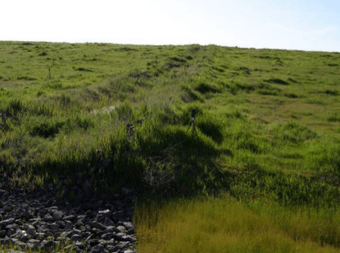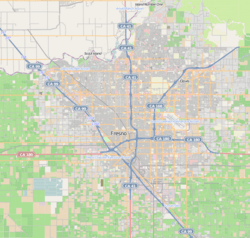Fresno Municipal Sanitary Landfill facts for kids
|
Fresno Sanitary Landfill
|
|

A drainage channel on the slopes of the former landfill
|
|
| Location | S. West Ave. and W. Jensen Ave., Fresno, California |
|---|---|
| Area | 140 acres (57 ha) |
| Architect | Jean Vincenz |
| NRHP reference No. | 01001050 |
Quick facts for kids Significant dates |
|
| Added to NRHP | August 7, 2001 |
| Designated NHL | August 7, 2001 |
The Fresno Municipal Sanitary Landfill was a really important place in Fresno, California. It opened way back in 1935 and was the first modern landfill in the United States. This landfill was special because it used new methods to handle trash. Workers dug trenches, pressed the trash down, and then covered it with dirt every day. This helped stop problems with rodents and scattered garbage.
The Fresno landfill became a great example for other landfills across the country. It was also one of the longest-running landfills. The City of Fresno managed it until it closed in 1989. By then, the landfill had grown to cover about 145 acres. In 2001, it was recognized as a National Historic Landmark because of its historical importance.
What Does the Landfill Look Like Now?
The old Fresno Municipal Sanitary Landfill is about 3 miles from downtown Fresno. It covers 140 acres of land. You can find it at the corner of South West Avenue and West Jensen Avenue.
The landfill looks like a big, rectangular mound. It's about 4,200 feet long and 1,250 feet wide. The mound rises about 60 feet above the ground around it. Its sides are quite steep, and it's covered with grass. This landfill was built a long time ago, so it doesn't have a special lining like modern landfills do.
How the Landfill Started
In the 1930s, cities like Fresno were growing fast. They needed a good way to get rid of all their trash for a long time. Fresno decided to try a new idea called a "sanitary" landfill.
In 1934, they started a test site. Workers dug a trench, filled it with trash, and then covered it with dirt from the next trench they would dig. This test worked well! So, in 1937, the city bought the current site and opened the landfill there. For many years, the city filled about 4.3 acres of land each year. They buried around 24,000 tons of trash annually.
Environmental Cleanup Efforts
In 1983, environmental experts from California checked the landfill site. They found that some gases, like methane and vinyl chloride, were escaping. These gases were moving into the areas around the landfill. They also found that some chemicals were getting into private water wells nearby.
Because of these findings, the site was put on a special list in 1988. This list is for places that need extra cleanup to protect the environment and people's health. The cleanup plan was finalized in 1989.




